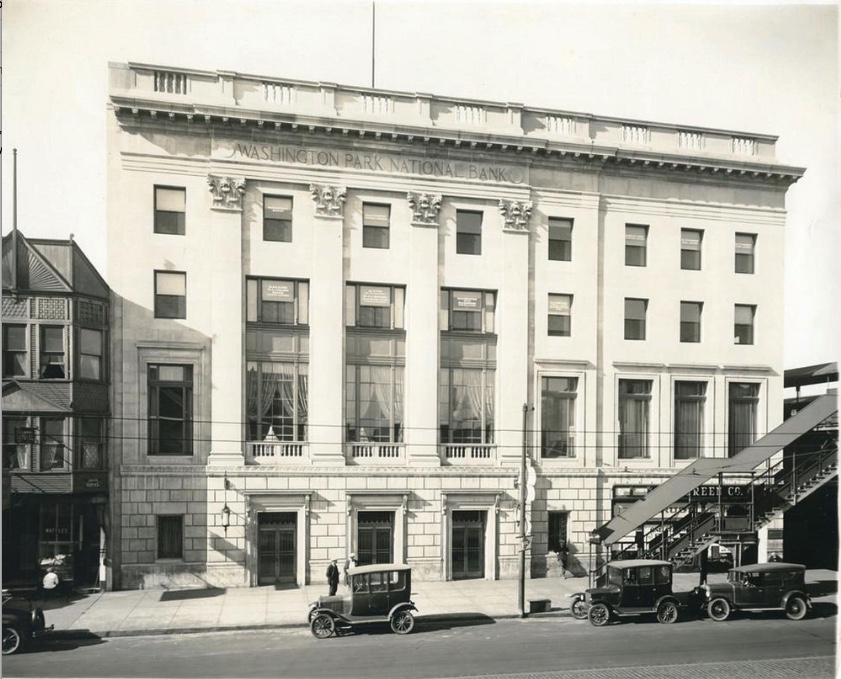By Woodlawn Works
The Cook County Land Bank Authority selected a development partner Wednesday to demolish the historic 1924 Washington Park National Bank Building at the corner of 63rd Street and Cottage Grove.

While pointing to five-story renderings, the CCLBA announced a plan to construct a three-story office and retail building with seven parking spaces in its place to house national retailers, organizations, and a co-working operation paid for by the YWCA and managed by an undisclosed “national enterprise.”
In partnership with the Metropolitan Planning Council, the CCLBA facilitated a community planning process to identify the community’s vision for the building, which had been allowed to accumulate $3.7 million in back taxes over a 20-year period of time.
Woodlawn residents identified a number of top priorities, including preserving the building if at all possible, local and diverse construction jobs, broad-based/local/diverse community and business development space, local retail, healthcare, and a bank.
“Please preserve this building. It could be redeveloped for so many uses,” said Linda Barnes at a community meeting.
“Please preserve this landmark building and return it to mixed use, with retail, offices, and maybe residential,” another resident, Eric Rogers, said. “It’s one of the last vestiges of 63rd Street’s heyday, and the building’s architectural charm is irreplaceable.”
The structure was found to be sound by the CCLBA’s engineering firm. Page 3 of their report states: “We believe that the existing framing system of the building is structurally sound, intact, and still in good condition. We believe that the building is salvageable and can be repaired to restore its full structural integrity.”
“We are going to save this building,” CCLBA executive director Rob Rose told a packed room of Woodlawn residents at one of the neighborhood’s community meetings.
At another community meeting, Rose said that “Without intervention, the fate of the building would have been demolition.”
This is the CCLBA’s first large-scale mixed use development, and CCLBA created a “model process” they hope to replicate for “fast, transparent, community-centric redevelopment.”
The CCLBA formed a selection committee that included a downtown developer, financier, one Woodlawn leader (the Apostolic Church) and an attorney. Several proposals were received last October, and a decision was expected within six weeks. Three finalists were selected. Two of the groups, East Lake as well as Woodlawn Works, proposed to keep the building. The third proposed demolition. The decision stretched into 2019 due to the “closeness and strength of the final groups.”
The development group eventually selected was allowed to make major changes to their proposal four months after the RFP response submission deadline, and right before the final selection. There was a 40% alteration to the height of the proposed building, usage (from combining YWCA organizational offices into the building to the sudden inclusion of “co-working”), as well as the apparent addition (with no disclosed letter of intent) of a University of Chicago initiative. The last-minute changes were on display at the public CCLBA announcement as Rob Rose pointed to 5-story renderings while touting a 3-story building, and sharing that the co-working space would be paid for by the YWCA but that the national operator was undisclosed.
Five people – including an architect, Woodlawn residents, and Preservation Chicago executive director Ward Miller – all made public comments at the announcement urging CCLBA’s board of directors to consider both community sentiment and adaptive reuse.
CCLBA chair Bridget Gainer then immediately lead the board in a vote to approve the recommendation. Chicago Commissioner David Reifman abstained, and Northlake Mayor Jeffrey Sherwin opposed the decision.
This was the CCLBA’s first involvement in large-scale, mixed use development, and CCLBA lauded its “fast, transparent, community-centric redevelopment model.”
The CCLBA has been linked to the Landmark Laramie State Bank in Austin, the Loretto Academy in Woodlawn, and the Gaitan Substation in Washington Park, all of which, like the Washington Park Bank Building, are on Preservation Chicago’s endangered list.
If the “model process” followed for the Washington Park Bank Building is repeated, the outcomes may be similarly grim.
It is important to note that these buildings, CCBLA dealings, and therefore this CCLBA RFP “model process” would impact historically significant buildings in predominately minority and lower-income communities.
*
About Woodlawn Works
Woodlawn Works is a diverse team of highly qualified Woodlawn-based community members in the fields of architecture, business development, community engagement, co-working, construction, finance, food services, accounting, and law who came together and submitted a response to the CCLBA RFP. Our team strongly opposes the demolition of the 1924 Washington Park Bank building. We share portions of our proposal and insights into the CCLBA process in order for neighbors to see that there were great adaptive reuse alternatives to demolition. We hope that the CCLBA and selected developer change course. We also call on the CCLBA to alter its “model process” which needlessly puts historic buildings – and thus heritage and culture – in minority and lower income communities at risk.
–
See also from Block Club Chicago:
“Of the three proposals considered finalists at Friday’s meeting, only one plan included razing the building completely. That proposal, from DL3 Realty’s Leon Walker, was ultimately approved by the land bank authority.”
–
Comments welcome.
Posted on March 20, 2019


